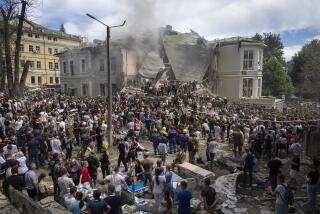Outcasts Among Chernobyl Victims
PUGACHEVKA, Ukraine — Of the countless Ukrainians suffering aftereffects of the Chernobyl nuclear disaster, 100 or so in this town are among the most vulnerable.
They are the children at the Pugachevka orphanage for the mentally disabled. Victims of disease, genetic problems, or their parents’ alcohol and drug abuse, they’ve been left in a stinking compound 80 miles from the site of the 1986 reactor explosion and fire that spewed a cloud of radiation over much of Europe.
Already weakened by their disabilities and the orphanage’s minimal care and inadequate food, their bodies are under siege by the radiation that still contaminates the area.
They are especially plagued by bone fractures because radioactive strontium replaces calcium, making their bones brittle. Children in the most contaminated parts of Ukraine are twice as subject as others to musculoskeletal problems and connective tissue disease, the Kiev Midwifery and Pediatrics Institute says.
“In fact, they are social outcasts,” said the orphanage’s director, Ivan Guliyev. “They have no future. They cannot be adopted for the society. But they are God’s children and have the right to live and be helped.”
Little help comes from the government. Social service funding in Ukraine has virtually vanished as the economy stumbles through the post-Soviet transition and corruption eats away at public funds.
“The government gives us 1.6 hryvnas a month per person to buy so-called ‘pure foodstuffs’ since we live in the officially recognized Chernobyl-contaminated zone,” Guliyev said. That’s about 30 cents. “How much food that’s pure from radiation can we buy for that -- and where?”
With government funding all but gone, the orphanage must rely on foreign donors to help keep even its small comforts.
Seven years ago, Fletcher A. Brothers, founder and director of Freedom Village USA, which works with troubled teenagers in the United States, met a Ukrainian immigrant who was aware of the troubles besetting orphans in his homeland. At the man’s urging, Brothers visited Pugachevka and five other orphanages in the region.
“I couldn’t stand by and do nothing as long as it was in my power to make a difference,” Brothers said.
Since then, Brothers’ group has donated $132,000 to the orphanage, or more than three times what it gets from the government each year, Guliyev says.
“The nation shows its true colors through its attitude toward those in need,” he added bitterly.
The orphanage’s 60 workers try to show different colors, at least by keeping the children clean and neatly dressed.
“I’ve gotten used to them, as if they were normal,” nurse Valentyna Moshkivska said. “But there’s obviously constant great psychological pressure.”
Although the halls sometimes reek of feces -- or of the harsh disinfectant used to clean -- the orphanage has some pleasant aspects. It consists of small cottages hidden among pine trees. An orchard, garden and pig farm add an air of rural calm. Some flowers bloom in well-tended plots.
For the children, it is home.
“Welcome, welcome,” a small, drooling girl said to a visitor.
“Welcome,” she said, again and again -- one of the few words she knows.
More to Read
Sign up for Essential California
The most important California stories and recommendations in your inbox every morning.
You may occasionally receive promotional content from the Los Angeles Times.










